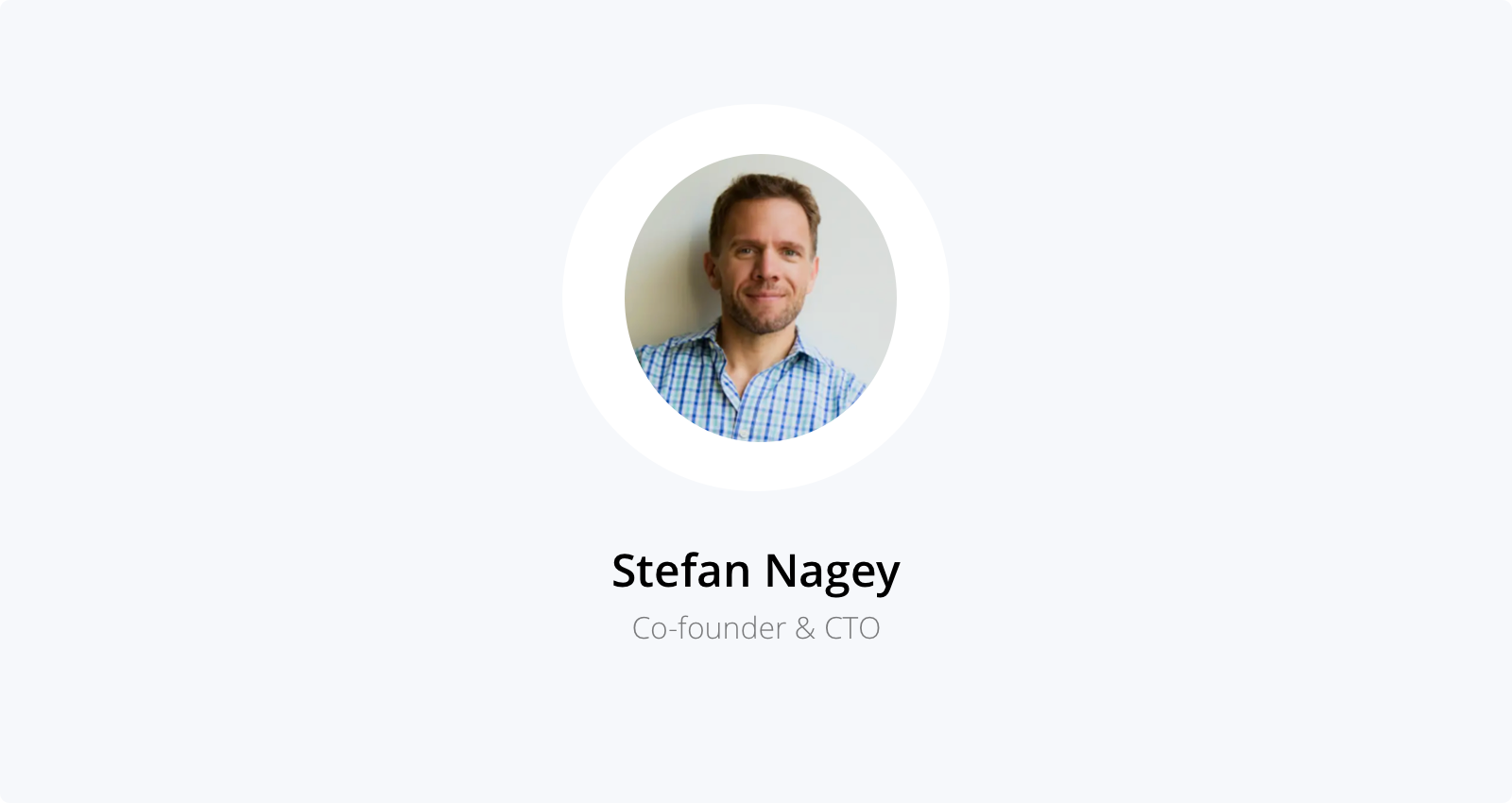
Stefan Nagey, One of Our Superhumans
 by Capbase Staff • 5 min readpublished January 27, 2021 • updated December 4, 2023
by Capbase Staff • 5 min readpublished January 27, 2021 • updated December 4, 2023

Can you let everyone know more about yourself, about your background and why you decided to start Capbase?
Sure! Capbase is the third or fourth startup that I've been involved with. Back in the late 2000s I was at Full Tilt Poker. I joined as employee number 36, and it was just a wild ride of going from basically nothing up to a place where we had hundreds of thousands of people on the site playing poker all at once, processing tens of millions of dollars transactions every day.
I was in charge of the customer acquisition and payments. It was a very wild ride but a lot of fun.
That kind of all came to an end with Black Friday, it meant the end of online poker in the US. Or the pause on online poker in the US at least.
After that, I worked for an agency where I did a lot of public diplomacy and helped people craft their messages for how they wanted to talk to either the general public or the US government..
After that I got the itch to just be building something again, so I left and joined another company, Dharma Platform, as a cofounder.
At Dharma, we built an awesome product that helped a whole bunch of people. We had customers like the World Health Organization and Doctors Without Borders. We built a tremendous team and raised a good amount of capital.
The company was going through some transitions and I was the CEO there, but I was transitioning out. We were hiring somebody with a private equity background to run the company.
I then met Greg through one of my co founders at Dharma. We got talking about the idea for Capbase. It just seemed like a great idea with a lot of potential upside. Something that the world really needed because it was solving not just problems that Greg had seen at his previous startup, but also the problems that I had seen at Dharma and the problems that I had seen at Full Tilt. So we decided to build it with the vision to open up and democratize the process of starting a company.
Our goal is to enable founders to be in a position where they don't have to have all that knowledge from having done this nine times before. We want it to be as easy as registering a domain name or something like that.
What was the most challenging part for you when you were trying to start up? What have you seen that sets apart successful startups from the unsuccessful ones?
The biggest thing that I've seen is being able to be ready to fail. When people say, "Be ready to fail," it's not like, “Oh, your whole company fails".
It's more like, “let's try this one idea and if it doesn’t work, then we'll try something else”. It's not getting attached to one particular way of servicing customers, one particular way of acquiring customers, or one particular way of designing your product or service. You've got to listen to what your users want. It's great to have an opinion about what your customers want or need. But if you can't explain it to your users and it doesn't solve their problem, then it's not going to do anything.
A lot of people avoid listening to their prospective customers because they fear that their idea might not be something worth pursuing after all. Do you agree?
Sometimes it's not, right? I’ve had another startup, between my agency and Dharma. It was a startup called Innovate.
We wanted to do unsupervised mobile device voting. What that means is you can participate in a local or national election from your cell phone. I did a whole bunch of research and wrote this huge white paper on how to implement it from a cryptographic standpoint and all those kinds of things. We tried going to market and it turns out that people aren't willing to pay a whole lot for something that the government usually pays for. We tried to crowdfund the idea and everybody that we talked to also thought it was a great idea. But when it's something that the government pays for, it's tough to get people excited about that because there's a lack of trust in government. They think that the government will mess it up somehow.
Would you say that the amount of bureaucracy around legal, financial, and administrative matters are blocking more startups from coming to life?
It's not that the bureaucracy around legal administration of a corporation is blocking startups. Nor is it designed to make it more difficult for a first time founder, a young founder, or a founder from a disadvantaged population to start a company.
It's that there is the privilege of the repeat founder of having done it before because there's a lot of research that goes into it. There's a lot of learning. There's a lot of trial and error. There's a lot of making mistakes and finding out the hard way of how to do these things that as a repeat founder you already know.
What Capbase is all about is trying to help level that playing field--to take the expertise of repeat founders and help the people who have never started a company before, who've never thought of starting a company before, who don't have interest in learning about the Delaware general corporate law, or the ins and outs of the intersection between the board of directors, the officers, the incorporator, your various share classes and whatever else the case may be. Because there's a lot there!
At the end of the day a corporation isn't a thing that actually exists. It's a collection of legal contracts that are written by lawyers and for lawyers. There are a lot of documents that go around a corporation. But when you're just starting out and there's not much money involved or there's not much of anything involved, it should be a lot easier to do. That's what Capbase is built to do and that's what we want to do.
We want to make sure that you don't have to have the background of an education in the law to be able to read these contracts and/or the interest and time to read fifty or sixty pages of documentation.
You know you want to start a business, right? You don't want to read a bunch of contracts, you want to start a business. So that's what we're making easy.
I have a story to illustrate exactly what I mean. At Dharma we initially formed as Nevada LLC because Nevada has private LLCs and they make it very appealing to people.
Then, as soon as we raised any real money, an investor was like “Well, we're not going to invest in this weirdo vehicle, you need to incorporate it as a Delaware C Corp, and then we’ll buy stock from you."
That's just how investments are done. Investors want to buy stock in Delaware C Corps because they understand the vehicle. They understand Delaware law and it makes things standard. That’s really what it's all about: standardization, making things easier, and reducing the friction in the process.
What are the main advantages you have been finding with remote work? What two or three tips do you have for other founders?
The biggest advantage of remote work is that you're not locked into the talent that is in any one geographical area.
Greg and I are on opposite sides of the United States. Greg is based in San Francisco. Neither one of us would have found the access to the talent that it takes to build a company like Capbase and be successful, operating solely in our local markets. So that's what I would say the biggest advantage as a founder is, it's not without drawbacks though.
Capbase was the first time that I have been working a hundred percent from home. We formed in late 2018 and it was the first fully remote operation that either Greg or I have been involved with.
It's challenging because you've got to set your day, you've got to set aside time to get outside and exercise or just get outside and be outside.
Especially in the early days of Capbase, there were times where I would go several days at a time coding, without stepping out of my front door. That has a toll on you and you don't necessarily recognize it super quickly.
There's also setting up a particular spot to work, making sure that you have a desk, setting aside different spaces for different things because you still have to maintain that work life balance some way.
Can you share an adventure our audience may not know?
That has to be when I was at Full Tilt and the founders of Neteller were flying over the US and got arrested for apparently no good reason. As a result of that Neteller announced that day that they were no longer processing transactions in the United States. That was like 70% of our business right there!
At that time, we had a fat client that you would download to your computer in order to play poker that handled the cashier and whatever else.
We're sitting in a brainstorming meeting and I said “Well, we could just move the cashier into a web view”. Then me and the client developer made it happen together.
I built the web cashier and he put a web view into the client, we spent the next 96 hours basically working straight to build that. But that was something that allowed Full Tilt to rebound quickly from what had happened - faster than our competitors - and it allowed us to go from the #16 in the market to the number #2 in the market almost overnight.
Finally, what is the best and worst advice you've ever received?
The best and worst pieces of advice I've ever got were both around how to deal with your board of directors.
The best advice that I ever got was to listen to the board of directors.
The worst advice that I ever got was to listen to the board of directors.
As a CEO, it's a very fine line to walk when you're dealing with your board of taking what they have to say as advice and as input versus thinking of them as your boss.
If you ever think of your board as your boss, then you're going to fail. Your board works for you. As the CEO you’re the one responsible for the company.
Your board is the one that has ultimate control over the company. But you're the one who's responsible for the success or failure.
You need to know that if you fail, you're going to get fired.
It doesn't matter if you're like “Well, I'm just doing what you guys told me”. If the board was wrong, the board stays on the board, if the CEO doesn't deliver, then the board gets a new CEO.

RELATED
Nancy Thanki, One of Our Superhumans
Nancy, one of our Project Managers, discusses what it's like to organize work being done at Capbase, and why she still prefers to use a paper notebook.

Written by Capbase Staff
Capbase is a team of designers, engineers, and business professionals spread across 6 time zones on 3 continents united by our passion for dogs, coffee, and great software.
Related
Greg Miaskiewicz, One of Our Superhumans
Serial entrepreneur Greg Miaskiewicz chats about creating a startup to help startups incorporate, issue stocks and manage cap tables.
 by Capbase Staff • 7 min read
by Capbase Staff • 7 min readWhat is an LLC and Why Choose it for Your Business?
Discover why an LLC is a smart choice for your business: offering personal liability protection, tax efficiency, and operational ease, it's ideal for entrepreneurs seeking a balance between security and flexibility.
 by Michał Kowalewski • 7 min read
by Michał Kowalewski • 7 min readNorthern Mariana Islands Business Entity Registration for Delaware Corporations
Is your company doing business in the Northern Mariana Islands? Get an easy-to-follow explanation about what forms you’ll need, information about registration fees, filing deadlines, naming requirements, and more.
 by Capbase Staff • 7 min read
by Capbase Staff • 7 min read